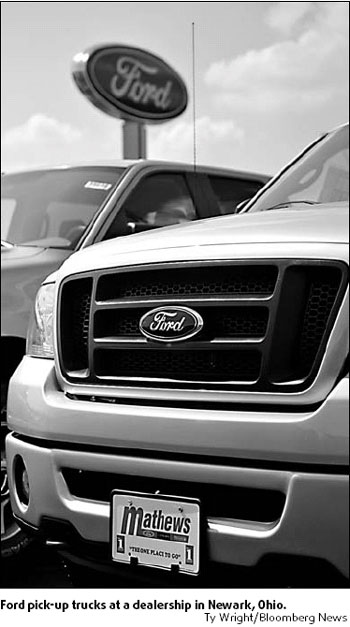Ford, UAW gear up for crucial talks
Ford Motor Co, battling a 12-year slide in US market share, negotiates a new contract this week with a United Auto Workers union seeking to extend job guarantees won at General Motors Corp and Chrysler LLC.
Ford posted record losses last year and says it plans to close 16 of 41 North American plants by 2012. Officials at the No 2 US automaker said in July they may shut fewer should they reach a favorable labor deal.
Ford's losses have been steeper than those at GM and Chrysler, which may make it tougher for bargainers to reconcile the union's desire for job guarantees for its 58,500 Ford members with the company's need to cut costs.
"I wouldn't be surprised if there is a strike," said Gary Chaison, a labor professor at Clark University in Worcester, Massachusetts. "Ford is really going to be a messy one."
UAW members at GM and Chrysler ratified four-year contracts containing job commitments this month following a six-hour walkout at Chrysler and a two-day strike at GM. The Chrysler deal was approved two days ago, shifting the union's focus to Ford.

Ford spokeswoman Marcey Evans and UAW spokesman Roger Kerson declined to comment.
The company's market share in the United States has fallen every year since 1995, when the Dearborn, Michigan-based automaker sold more than one in every four cars and trucks in the country.
Ford's share stood at 16 percent this year through September. That includes figures from Jaguar and Land Rover, British brands Ford is selling to raise cash and allow it to focus on restoring profit in North America.
Ford's annual US sales are now 1.3 million below what they were at the start of the decade - equivalent to the output of five plants. Ford's US share has fallen behind Toyota Motor Corp's this year.
The "real issue" at Ford will be the company's commitment to produce vehicles at specific remaining plants, said Richard Block, a labor professor at Michigan State University in East Lansing.
In June, UAW Vice-President Bob King told union officials that the union's "No 1 priority" at Ford "is product for our facilities", according to a person familiar with his remarks.
In Wayne, Michigan, for example, workers are assured of building the Ford Focus small car through 2009, said Bill Johnson, bargaining chairman of UAW Local 900 at the plant.
As part of the talks, the UAW hopes to secure commitments that its members will build four new vehicles in the United States starting in 2010, said Johnson. One, he hopes, will go to Wayne.
Stronger support at GM
At GM, 66 percent of production workers voted to ratify the contract. About 56 percent of those workers approved the Chrysler settlement, the union said on Saturday.
Ford Chief Executive Officer Alan Mulally told the Associated Press this month his company could accept "the basic framework" of the GM and Chrysler agreements.
The union's four-year contract with GM calls for the Detroit-based automaker to put $29.9 billion into a retiree- health trust fund that takes effect in January 2010.
The deal with Chrysler would have the company spend $8.8 billion to finance a similar fund.
Those funds will take billions of retiree healthcare obligations off the books of the two automakers.
GM pledged to include some models scheduled to begin production as late as 2013, according to a union summary. Chrysler's guarantees didn't run as long, which spurred greater UAW opposition to its accord than GM's.
Limited options
Ford's options may be limited, said Clark University's Chaison.
"I think Ford is the automaker closest to bankruptcy," he said.
"I don't think they're in a position to make product guarantees. Even if there are commitments, they may make them weak and short term."
Joe Hinrichs, vice-president of North American manufacturing, said on July 23 the final number of plant shutdowns is "subject to whatever we come up with in negotiations". Ford has identified 10 of the 16 plants it says it will close.
The union recognizes Ford's vulnerability, said David Cole, chairman of the Center for Automotive Research in Ann Arbor, Michigan.
"The Ford negotiation is going to be significantly easier because I think the membership is aware of the gravity of the competitive issues that they face," he said.
Bloomberg News
(China Daily 10/31/2007 page16)














